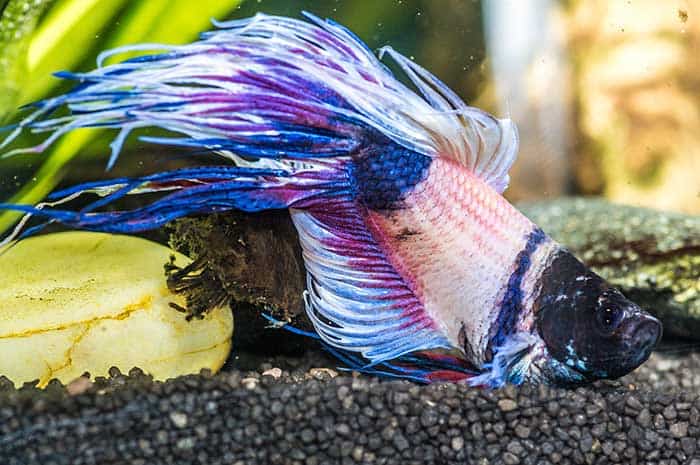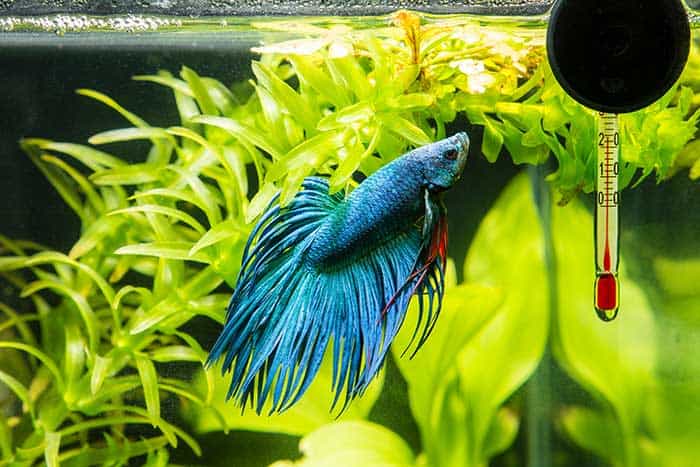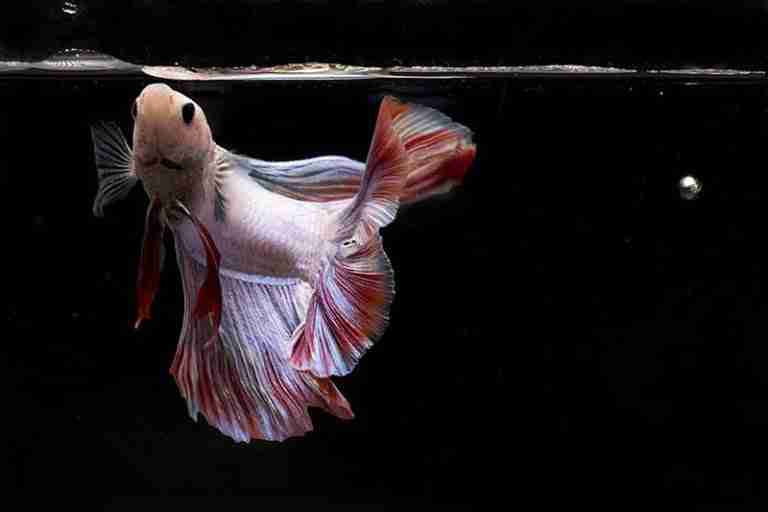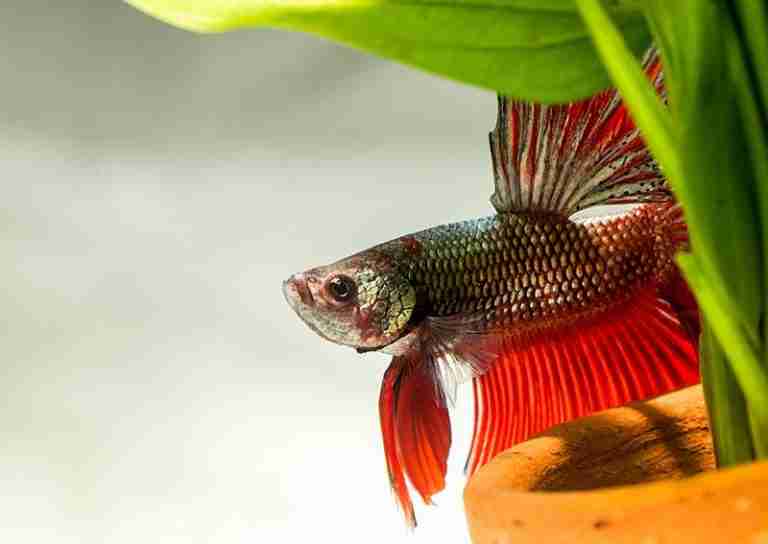Are Betta Fish Freshwater Or Saltwater
Betta fish have become extremely popular over the last decade, kept in home aquariums all over the world. So, are betta fish freshwater or saltwater (or even brackish) due to the harsh conditions they tolerate in the wild?
Betta fish are freshwater labyrinth fish, not saltwater. Soft water is preferred, with a degree of hardness (dH) less than 25. Betta fish also prefer neutral to slightly acidic aquarium water with a pH of 6.5 to 7. Some people think they live in saltwater because they can tolerate salt better than other fish.
Some people think betta fish live in saltwater because they live in rice paddies, ponds, and slow-moving streams in Thailand, Cambodia, Vietnam, and Laos, which may occasionally have some salt due to tidal flows or relentless monsoon rains that flood them for short periods.
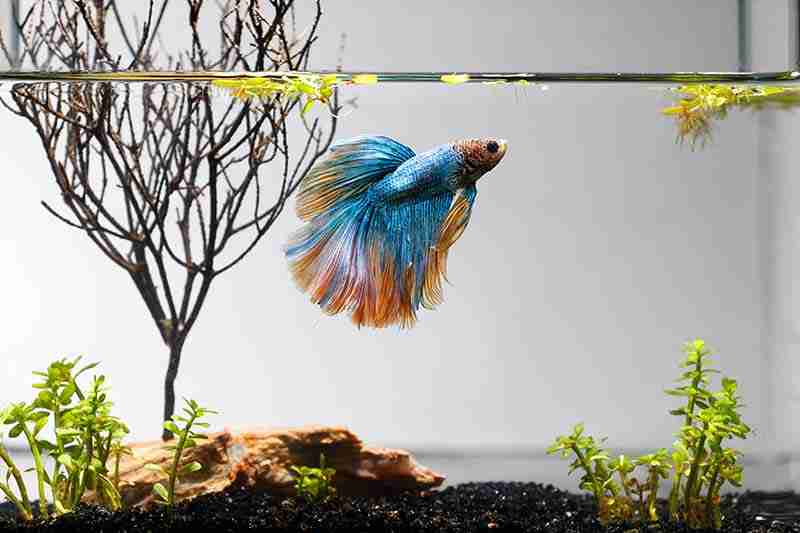
Labyrinth fish have a labyrinth organ, which enables them to breathe oxygen from the air, helping them survive in more difficult water conditions, as wild bettas would often need to do.
Another reason people ask if betta fish are freshwater or saltwater is that there’s a species of saltwater betta unrelated to freshwater betta fish, known as the “Marine betta” or “Comet.”
Make sure to check out our in-depth guide on betta splenden care.
Can You Put Betta Fish in Saltwater
Even though betta fish can tolerate higher levels of saltwater than many other freshwater aquarium fish, bettas should not be kept in saltwater tanks. Bettas can survive for a while in salt water, but bettas live and thrive in freshwater.
The betta’s natural home is the freshwater river basins of Thailand, where bettas evolved to live and breed. In nature, bettas avoid predators by living in heavily vegetated areas, which they rarely encounter in a saltwater tank.
Because betta fish can tolerate low salt levels, they can also survive in slightly brackish water, however, too much or too little salt can upset how a fish regulates the level of solutes within their body. through the process of osmoregulation.
What Is Osmoregulation In Fish
Osmoregulation in fish involves several mechanisms, including ion uptake, excretion, and water balance regulation. Freshwater fish live in environments with lower concentrations of salt than their body fluids, so they actively uptake salts through specialized cells in their gills to maintain the proper salt balance.
Saltwater fish live in environments with higher salt concentrations than their body fluids, so they excrete excess salt through their gills and other organs to avoid dehydration.
Individual fish species are better at either increasing or decreasing the salinity level of their body fluids based on a water type specifically suited to them. Put your fish in the wrong type of water, and they will struggle to regulate their body fluids.
Osmoregulation is critical for the survival and health of fish and other aquatic organisms.
Can I Add Aquarium Salt To A Betta Tank
Many betta owners like to add aquarium salt to their betta tanks. Although unnecessary, this can be a positive step towards protecting against diseases such as betta white spot (Ich) and betta fin rot in low doses.
Aquarium salt can be bought at your local pet store and is a commonly used treatment against such illnesses. In small amounts, betta fish can tolerate salt just fine. Just be sure to research the correct dosage before adding salt to the betta tank.

Salt does not evaporate like water, so you won’t need to add more salt when you top off the fish tank with fresh water.
I use API Aquarium Salt, which can be purchased online. Find The Best Price For API Aquarium Salt
Betta Fish Water Requirements
Although I have mentioned that betta fish are quite a hardy fish species and can tolerate changes in water parameters outside of their usual range, it is important to note that bettas can “survive” these changes, not “thrive” in these changes. So what are the ideal betta fish water parameters?
You can find the ideal water parameters for betta fish in the table below.
| Parameter | Suggested Value |
|---|---|
| Prefered Water Hardness dH (Degree of Hardness) | Soft (dH less than 25) |
| pH (Power of Hydrogen) | Neutral to Slightly Acidic (pH 6.5-7) |
| Preferred Water Temperature Range | 78° to 80° Fahrenheit, (25.5° – 26.7° Celsius) |
| Survivable Water Temperature Range | 72° – 86° Fahrenheit (22.2° – 30° Celsius) |
The parameters above are preferable for betta fish, so for community tanks, it’s best to find tank mates with similar needs.
Find out how to set up a betta tank correctly to avoid potential problems occurring afterward.
Tank Temperature
A common question that I hear is, “Do betta fish need a heater?” Betta fish are tropical fish requiring warm water, and when the betta tank water conditions remain within the ranges above, your betta will thrive. Betta fish will not mind too much if the parameters should fall outside of these ranges to a small degree.
Raising or lowering the temperature of the betta tank water by just a degree or two will be fine, providing this temperature remains stable. Betta fish are quite tolerant as long as the conditions they live in remain consistent.
Using a heater is the best way to keep your betta tank water temperature stable and at optimal conditions.
What I Use
If you require a heater for your betta tank, I have made a few recommendations below.
SunGrow Betta Fish & Turtle Aquarium Tank Water Heater, 10-Watt (Find The Best Price).
Eheim Jager Thermostat Aquarium Heater 50-Watt (Find The Best Price).
Cobalt Aquatics Electronic Neo-Therm Pro Submersible Aquarium Heater, 75-Watt (Find The Best Price)
Filtration
Betta fish prefer slow-moving water, similar to what they experience in their natural habitat, so you won’t need a strong filter system.
If your filter is too powerful, there are several ways to weaken the flow. You can point the filter toward the tank glass to diffuse it slightly or raise the filter slightly above the water level. Just ensure there is a strong enough flow to reach all areas of the tank.
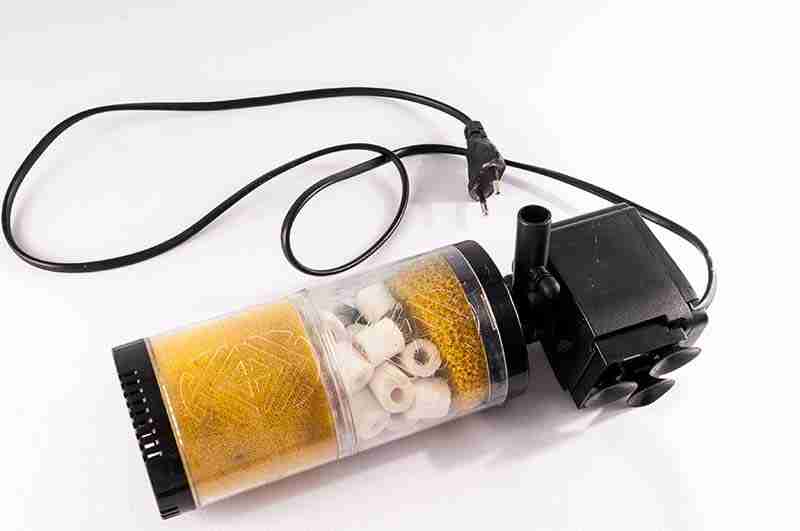
If you don’t use a filtration system and have a relatively small tank, you will need to change your betta fish tank water more frequently.
What I Use
If you require a filter suitable for a betta tank, I have made a few recommendations below.
TARARIUM Quiet Betta Fish Tank Filter Air Pump Filtration With Rain Feature (Find The Best Price)
Aqueon Submersible Internal Aquarium Filter, 40-Gallon (Find The Best Price)
Fluval Aquarium Power Filter – Available for various tank sizes (Find The Best Price)
Plants
It is wise to add live plants to your betta tank where possible.
Plants create atmosphere and help emulate a wild betta fish’s natural environment. Live plants make a betta’s home more appealing and comfortable by adding natural beauty, providing a food source and somewhere to hide whilst also serving as an oxygenating plant.
Although you can buy a good selection of aquarium plants at your local pet store, you can also find an enormous selection online that are well packaged for shipping and arrive in excellent condition.
Check out the massive variety of aquarium plants available on Amazon
Conclusion
The question, are betta fish freshwater or saltwater is pretty straightforward to answer, they are definitely freshwater fish for a significant tolerance to salty or brackish water. This tolerance to salt is beneficial as low doses of aquarium salt can be used to relieve injuries and to remove pests.
As betta fish owners and betta keepers, we should ensure we understand betta fish water requirements, the correct tank temperature, and all other betta care basics before we take one home.


